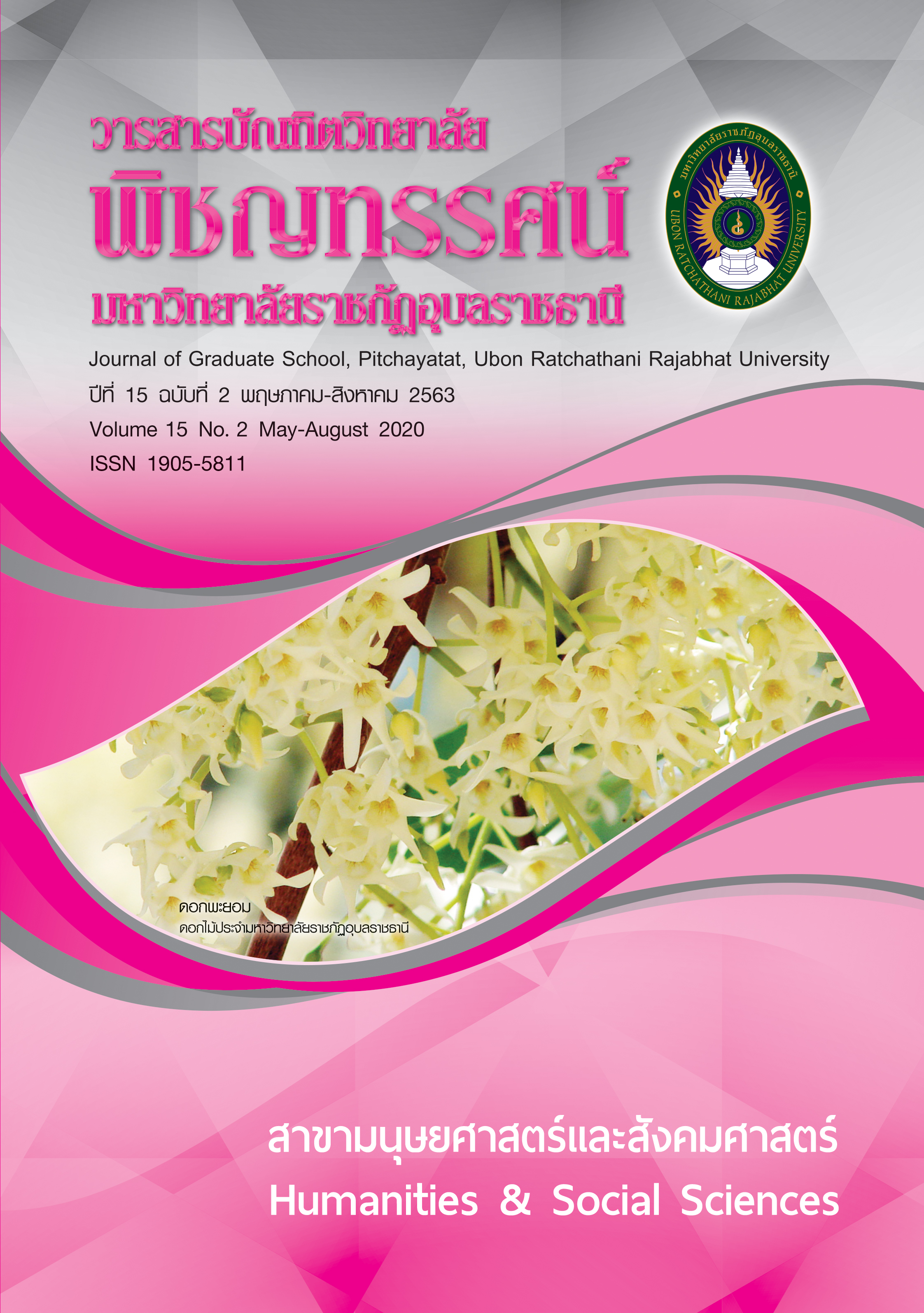การพัฒนาอภิปัญญาและผลสัมฤทธิ์ทางการเรียนวิทยาศาสตร์โดยการจัดการเรียนรู้แบบใช้ปัญหาเป็นฐาน เรื่อง การเจริญเติบโตและการตอบสนองของพืช สำหรับนักเรียนชั้นมัธยมศึกษาปีที่ 5
คำสำคัญ:
การจัดการเรียนรู้แบบใช้ปัญหาเป็นฐาน, อภิปัญญา, ผลสัมฤทธิ์ทางการเรียนวิทยาศาสตร์บทคัดย่อ
การวิจัยนี้มีวัตถุประสงค์เพื่อ ศึกษาวิธีการจัดการเรียนรู้แบบใช้ปัญหาเป็นฐานเพื่อพัฒนาอภิปัญญาและผลสัมฤทธิ์ทางการเรียนวิทยาศาสตร์ เรื่องการเจริญเติบโตและการตอบสนองของพืช โดยใช้การวิจัยเชิงปฏิบัติการในชั้นเรียน กลุ่มเป้าหมายคือ นักเรียนจำนวน 41 คนในชั้นมัธยมศึกษาปีที่ 5 เครื่องมือที่ใช้ในการวิจัย ได้แก่
1) แผนการจัดการเรียนรู้ 2) ใบกิจกรรม 3) แบบประเมินตนเอง 4) แบบทดสอบเพื่อวัดผลสัมฤทธิ์ทางการเรียนวิทยาศาสตร์ และ 5) แบบสะท้อนผลการจัดการเรียนรู้ การวิเคราะห์ข้อมูลเชิงเนื้อหา สถิติที่ใช้ได้แก่ ร้อยละ ค่าเฉลี่ย ส่วนเบี่ยงเบนมาตรฐานและการวิเคราะห์เนื้อหา
ผลการวิจัยพบว่า
การจัดการเรียนรู้แบบใช้ปัญหาเป็นฐานเพื่อพัฒนาอภิปัญญาและผลสัมฤทธิ์ทางการเรียนวิทยาศาสตร์ ควรมีลักษณะดังนี้ ขั้นที่ 1 ครูนำเสนอสถานการณ์ปัญหา ขั้นที่ 2 นักเรียนระบุประเด็นสำคัญและประเด็นที่สงสัย ขั้นที่ 3 การระดมสมองเพื่อระบุเนื้อหาที่เกี่ยวข้อง แนวทางการแก้ปัญหาที่เป็นไปได้ และเลือกวิธีแก้ปัญหาที่ดีที่สุดพร้อมอธิบายเหตุผล ขั้นที่ 4 การระบุประเด็นที่ทราบและประเด็นที่ต้องสืบค้น ขั้นที่ 5 การระบุวิธีการรวบรวมข้อมูลและวางแผนเพื่อดำเนินการแก้ไขปัญหา ขั้นที่ 6 การสืบค้นข้อมูลและการติดตามการเรียนรู้ของตนเอง และขั้นที่ 7 การฝึกฝนการอภิปราย อภิปรายเพื่อหาข้อสรุป อธิบายขั้นตอนการดำเนินงาน ประเมินผลการดำเนินงานและวิธีการเรียนรู้ของตนเอง รวมถึงระบุผลการเรียนรู้ที่เกิดขึ้น ผลการพัฒนาอภิปัญญาพบว่าหลังการจัดการเรียนรู้นักเรียนมีอภิปัญญาเพิ่มขึ้นทุกองค์ประกอบโดยมีคะแนนเฉลี่ยก่อนเรียนและหลังเรียนเท่ากับ 3.64 และ 4.22 ตามลำดับ ผลสัมฤทธิ์ทางการเรียนวิทยาศาสตร์พบว่านักเรียนมีคะแนนเฉลี่ยสูงขึ้นโดยมีคะแนนเฉลี่ยก่อนเรียนและหลังเรียนเท่ากับ 10.51 และ 13.34 ตามลำดับ
คำสำคัญ: การจัดการเรียนรู้แบบใช้ปัญหาเป็นฐาน อภิปัญญา ผลสัมฤทธิ์ทางการเรียนวิทยาศาสตร์
เอกสารอ้างอิง
ธนาวุฒิ ลาตวงษ์ และคณะ. “ผลการจัดการเรียนรู้ตามรูปแบบการจัดการเรียนรู้วิทยาศาสตร์แบบ5Aที่มีต่ออภิปัญญาและผลสัมฤทธิ์ทางการเรียนวิทยาศาสตร์ของนักเรียนชั้นมัธยมศึกษาปีที่ 3,” วารสารวิชาการ Veridian E-Journal บัณฑิตวิทยาลัย มหาวิทยาลัยศิลปากร. 9, 2 (กรกฎาคม 2559): 269-286.
บุญชม ศรีสะอาด. การวิจัยเบื้องต้น. กรุงเทพฯ: สุวีริยาสาส์น, 2545.
พาสนา จุลรัตน์. “เมตาคอกนิชันกับการเรียนรู้,” วารสารวิชาการศึกษาศาสตร์. 14, 1 (มกราคม 2558): 1-17.
พิสณุ ฟองศรี. การสร้างและพัฒนาเครื่องมือวิจัย. กรุงเทพฯ: บริษัท ด่านสุทธาการพิมพ์ จำกัด, 2554.
ภัทรลักษณ์ สังข์วงษ์. การพัฒนาความคิดอภิปัญญาโดยการจัดกิจกรรมการเรียนรู้ตามทฤษฎีการเรียนรู้เพื่อสร้างสรรค์ด้วยปัญญาเรื่องวิวัฒนาการของนักเรียนชั้นมัธยมศึกษาปีที่ 6. กรุงเทพฯ: มหาวิทยาลัยเกษตรศาสตร์, 2556.
ศรัลยา วงเอี่ยม และคณะ. “การพัฒนาผลสัมฤทธิ์ทางการเรียนและความสามารถในการคิดแก้ปัญหาทางวิทยาศาสตร์วิชาชีววิทยาเรื่องสิ่งมีชีวิตกับสิ่งแวดล้อมของนักเรียนชั้นมัธยมศึกษาปีที่ 4 ที่ได้รับการจัดการเรียนรู้
โดยใช้ปัญหาเป็นฐาน,” วารสารศึกษาศาสตร์ มหาวิทยาลัยนเรศวร. 18, 2 (มิถุนายน 2559): 194-201.
ส่งเสริมการสอนวิทยาศาสตร์และเทคโนโลยี, สถาบัน. การแก้ปัญหาแบบร่วมมือบทสรุปสำหรับผู้บริหาร. (ออนไลน์) 2561 (อ้างเมื่อ 6 ตุลาคม 2561). จาก https://library.ipst.ac.th/handle/ipst/6138
ส่งเสริมการสอนวิทยาศาสตร์และเทคโนโลยี, สถาบัน. การวัดผลประเมินผลวิทยาศาสตร์. กรุงเทพ: ซีเอ็ดยูเคชัน, 2555.
ส่งเสริมการสอนวิทยาศาสตร์และเทคโนโลยี, สถาบัน. รายงานผลการวิจัยโครงการTIMSS 2015. (ออนไลน์) 2558 (อ้างเมื่อ 6 ตุลาคม 2561). จาก http://timssthailand.ipst.ac.th/timss/reports
Alex Q. and Eleanor S. Metacognition and Self-regulated learning. (Online) 2018 (Cited 2018 Oct 08). Available from: https://educationendowmentfoundation.org.uk/tools/guidance reports/metacognition-and-self-regulated-learning/
Barrett, T. A New Model of Problem-based learning: Inspiring Concepts, Practice Strategies and Case Studies from Higher Education. Maynooth: AISHE, 2017.
Demore, W. Know Thyself: Using Student Self-Assessment to Increase Student Learning Outcomes. Masters of Natural Science in Middle Level Mathematics University of Wyoming, 2017.
DiDonato, N. C. “Effective self- and co-regulation in collaborative learning groups: An analysis of how students regulate problem solving of authentic interdisciplinary tasks,” Instructional Science. 41, 1 (2012): 25-47.
Downing, K. et al. “Problem-based-learning and the development of metacognition,” Higher Education. 57, 5 (May 2009): 609-621.
Greene, J. A. et al. “Fostering high-school students' self-regulated learning online and across academic domains,” The High School Journal. 99, 1 (Fall 2015): 88-106.
Haryani, S., Wijayati, N., and Kurniawan, C. “Improvement of metacognitive skills and students’ reasoning ability through problem-based learning,” In: Prof. Dr. Sutikno, S.T., M.T., editor Journal of Physics: Conference Series. ICMSE2018; 18-19 September 2017; Semarang, Central Java, Indonesia, 2018. pp. 1-5.
Husamah, H. “Blended project-based learning: Metacognitive awareness of biology education new students,” Journal of Education and Learning. 9, 4 (November 2015): 274-281.
KKathy D. The Importance of Student Self-Assessment. (Online) 2015 (Cited 2018 Nov. 8). vailable from: https://www.nwea.org/blog/2015/page5
Loyens, S. M., Jones, S. H., Mikkers, J., and Van Gog, T. “Problem-based learning as a facilitator of conceptual change,” Learning and Instruction. 38 (August 2015): 34-42.
Piramanayagam, M.M. and Kasirajan, V. “Impact of decision making ability on academic achievement of higher secondary school students,” GJRA. 6, 7 (July 2018): 27-28.
Schraw, G., and Dennison, R. S. “Assessing metacognitive awareness,” Contemporary educational psychology. 19, 4 (October 1994): 460-475.
Tanner, K. D. “Promoting Student Metacognition,” CBE Life Sci Educ. 11, 2 (June 2012): 113-120.
Velzen, J. V. Metacognitive Knowledge: Development, Application, and Improvement. Charlotte, NC: IAP., 2017
ดาวน์โหลด
เผยแพร่แล้ว
รูปแบบการอ้างอิง
ฉบับ
ประเภทบทความ
สัญญาอนุญาต
บทความทุกเรื่องได้รับการตรวจความถูกต้องทางวิชาการโดยผู้ทรงคุณวุฒิภายนอกอย่างน้อย 3 คน ความคิดเห็นในวารสารพิชญทรรศน์เป็นความคิดเห็นของผู้นิพนธ์มิใช่ความคิดเห็นของผู้จัดทำ จึงมิใช่ความรับผิดชอบของวารสารพิชญทรรศน์ และบทความในวารสารพิชญทรรศน์สงวนสิทธิ์ตามกฎหมายไทย การจะนำไปเผยแพร่ต้องได้รับอนุญาตเป็นลายลักษณ์อักษรจากกองบรรณาธิการ





